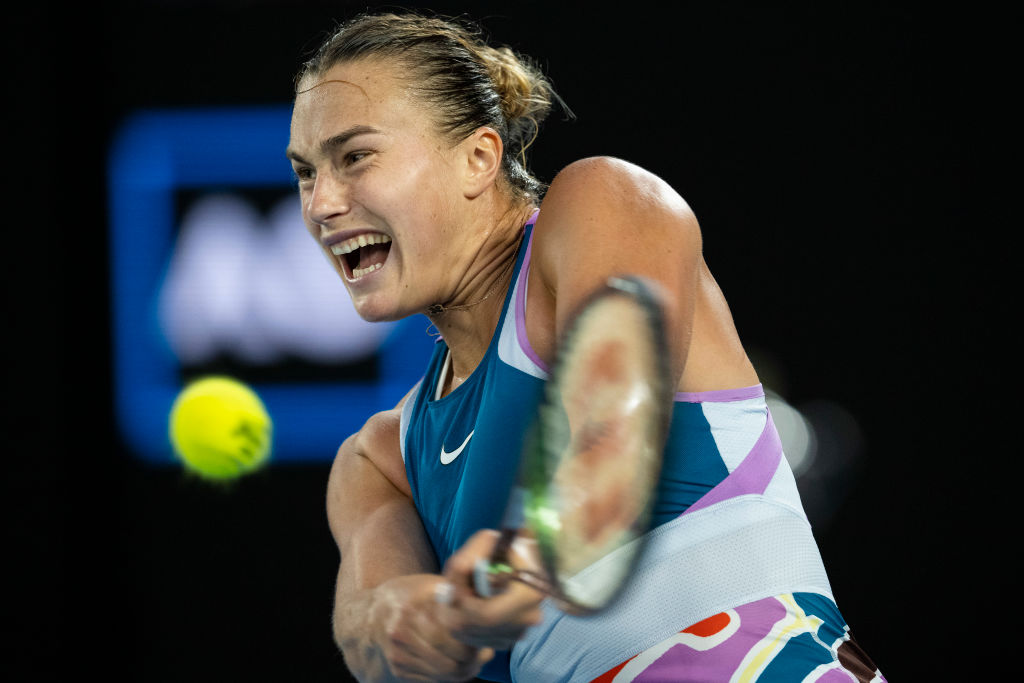It's cosmically right that the Australian Open ended with Aryna Sabalenka serving it out. She'd spent the year 2022 staggering across the world, a superstar without a serve; the best way to grasp the severity of her yips is to consider the season's final tally of 428 double faults in 55 matches. En route were tears, an underarm serve, an intervention from a biomechanics specialist. The serve got a little better as the year wore on, though Sabalenka finished the campaign without a singles title to her name for the first time in four seasons. At the year-end finals, she dubbed herself the "queen of double faults."
In 2023, that once-wayward serve has been brought into alignment with the rest of her high-powered and devastating game. She didn't drop a set all month until Saturday, in her Australian Open final against Elena Rybakina, which she won, 4-6, 6-3, 6-4. She resolved two puzzles along the way. Sabalenka is no longer a spectacular player with a spectacular flaw, and no longer the best player on tour without a major title to her name. “I always had this weird feeling when people would come to me and ask for a signature," the 24-year-old said after her victory. "I would be like, ‘Why are you asking for signature? I’m nobody. I’m a player. I don’t have a Grand Slam.'" That specific demon is now gone. After stalling out thrice in major semifinals, she has finished the task.
It's a little tautological to say that a major final involves the two players who performed best over the previous fortnight, but it is true in this instance. Both the No. 22 seed Rybakina and No. 5 Sabalenka trucked through the opposition in Australia, a pair of 6-footers who vary in their particulars but share the same sort of domineering power. Technically, Sabalenka opts for more spin, while Rybakina hits a flatter ball. Physically, Sabalenka is built and explosive, Rybakina willowy and economical. Emotionally, they run at the same absolute temperature, with opposite signs—Sabalenka all furrowed rage, Rybakina all dissociated zen. They'd played three times before, all swept by Sabalenka, but those matches occurred before the 23-year-old Rybakina put it together for real and won Wimbledon 2022. This final promised a more accurate read on the matchup between two of the tour's baseline masters.
Sometimes a meeting of two uncompromising power hitters can feel disjointed and underwhelming. At its worst there's no interplay, no intrigue, just two shooters alternately taking potshots at a beer can on a stump. That does not describe this final, which was two hours and 28 minutes of steely execution. It was rife with winners—seven aces in the match's first 13 points does set a tone—but also featured just enough creative, taut exchanges to sustain interest. It's about as psychologically gripping as a match can get with a maximum rally length of 13 and an average length of 3.28. For all the risks taken, the combined numbers ran clean: 82 winners and 53 unforced errors. A seesaw second set drew brilliant tennis out of both players, with seven of its nine games going to deuce, and each woman using a perfect serve to wriggle out of scoreboard crises. Sabalenka did well to target Rybakina's relatively shaky forehand, a wiser tack than testing one of the most pristine backhands in the world. The winner would be the woman who could sneak in a few well-placed counterattacks in these punishing service games. Sabalenka broke serve three times, Rybakina two.
Keeping to her tragicomic theme, Sabalenka began the match with a double fault. Hours of toil later, with her first championship point in hand, she blooped up another one. Two more unforced errors marred that final game, but on the fourth championship point, Sabalenka drew an error from Rybakina, collapsed, and wept. Then she went over to her coach, Anton Dubrov—who, at the peak of her serve dysfunction last year, had offered his resignation, only for her to refuse—and he wept into his towel, too.
Last summer, Sabalenka enlisted a specialist to unkink the biomechanics of her service motion. Ahead of this season, she split with her sports psychologist—"because every time [I'm] hoping that someone will fix my problem, it's not fixing my problem"—and has since, with a laugh, declared herself her own psychologist. The sum of these decisions was wresting back control over her serve and her trajectory as a player. Next week Sabalenka returns to No. 2 in the world, matching the career-high ranking she'd had heading into this same tournament last year. Back then the momentum was downward, but not anymore. She is a tennis player repaired, entering her physical prime, and keyed in to crush anything—including, blessedly, her own ball toss on second serve.





